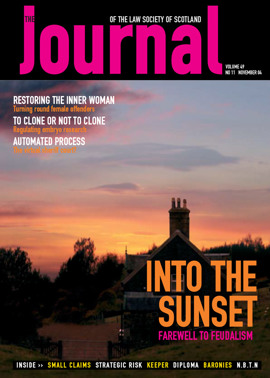Robbing the poor?

The Scottish Consumer Council (SCC) never used to worry me until politicians started taking it too seriously. It must be the only body in Scotland with a statutory remit to pontificate on any conceivable issue. The problem is it insists it does so on behalf of the entire population. Of course, the SCC doesn’t use the word “public”; it uses a “consumer” tag.
Even if the SCC does genuinely represent anyone, whose interests can it represent? The SCC is obsessed with “consumer choice” and “value for money”. Most of my clients in Glasgow Govan exist on £50 to £60 per week. To say they had a “consumer choice” would be contemptuous and ridiculous. Perhaps then it is no coincidence that the SCC generally comes up with proposals which favour the well off.
A case in point is the proposal to increase jurisdictional thresholds in the sheriff court (and Court of Session by way of privative jurisdiction). The Labour MSP John Home Robertson recently tabled a motion for debate in the Scottish Parliament, asserting that (a) the case for updating the small claim and summary cause limits to £5,000 and £15,000, respectively, had been made, and (b) such change was urgently necessary to improve affordable access to justice.
Just who is pushing this political agenda? In a written response to criticism from my colleague Jon Kiddie at Govan Law Centre on this subject, the SCC asserted its position as follows (Journal, July 2004, page 10): “Having weighed up the evidence, we consider that on balance an increase would be likely to benefit more people than would lose out.”
Allow me to deconstruct.
1. “Having weighed up the evidence”
The most recent research carried out by the SCC (Knowledge of Consumer Rights in Scotland, 2003) confirmed that only 7% of members of the public surveyed would consider using the small claims procedure for a consumer problem. In England and Wales (where the small claims limit has been raised twice – to £3,000 in 1996 and £5,000 in 1999) empirical evidence has confirmed that these increases only produced a minor uptake in claims. More importantly, English research concluded that “the majority of small claims cases with a value between £3,000 and £5,000 involve commercial organisations suing other organisations”. All of the evidence reveals that the small claims procedure has been a major flop from a “consumer” perspective. Yet, the SCC wants to expand its remit.
2. “Likely to benefit more people than would lose out”
This is where the SCC reveals its priorities. The SCC is content for more Scottish citizens being denied access to civil legal aid – there being none for small claims actions – as this is an acceptable casualty in its opinion. Just who is eligible for civil legal aid these days? Only the very poor or modestly paid (and only then with a contribution). Thus the SCC is content to rob from the poor in order to help the better off. Please don’t tell the people of Scotland that the SCC’s reforms would do anything for Scotland’s poor and low paid. My concern is that the reforms would undermine the ability of the most vulnerable members of our society to access the civil justice system.
In the same letter the SCC threw a bone to the poor and low paid who suffer personal injuries. It asserted: “Personal injury cases pose particular problems... exempting such claims from the small claims procedure would leave scope for legal aid availability”. If only life were so simple.
This back pedalling reveals an inability to grasp the fundamental principles of how many citizens currently obtain access to civil justice in Scotland. For example, Govan Law Centre (and other solicitors in Scotland) undertakes a significant volume of compensation claims for tenants who live in damp, cold and miserable living conditions. Many claims come in at £2,000 to £4,000 in value. These are claims for solatium for breach of contract, together with a claim for damage to moveable goods. They are not personal injury claims.
In order to succeed in these claims one must obtain evidence from an architect. If the small claims limit was raised to £5,000 all poor people who lived in conditions not reasonably fit for human habitation would be denied access to civil justice. No civil legal aid would be available, and even if a case was undertaken for free by a law centre, who would pay for the attendance of an expert witness in court?
If you think about it, the current small claims system is inappropriate for any case where an expert witness is needed. How do you establish that a car was unfit for the purpose for which it was intended or that a plasma screen television had a latent defect? The bottom line is that in any case where expert evidence is essential the small claims procedure will always be inappropriate. The SCC fails to appreciate this, and space does not permit me to advance the kind of workable solutions that could be considered to accommodate the needs of all potential litigants.
On a more positive note, many Scottish trade unions, law centres and private legal firms in Scotland have chosen to challenge the SCC’s proposals. There is a wide alliance because these proposals would not only undermine law centre work in Scotland, but would also remove the ability of trade unions to operate free legal representation schemes for members who suffer injuries at work, and undermine the ability of legal firms to operate “no win, no fee” schemes in the wider field of personal injury litigation (including accidents at work as well as road traffic injuries).
The Labour MSP Elaine Smith has lodged a progressive amendment1 to the SCC-inspired motion in the name of John Home Robertson MSP. Govan Law Centre makes no apologies for having vigorously lobbied all MSPs about the flaws in the SCC’s proposals. Many MSPs – to their great credit – have recently removed their name from Mr Home Robertson’s motion.
Unlike the SCC, Govan Law Centre will continue to advocate the rights of the poor and low paid. And unlike the SCC, Govan Law Centre is directly accountable to local people who make up our management committee. Many of our board members live on benefits or a low wage. “Consumers”? They are real people, just like our clients who require access to civil justice.
Mike Dailly is Principal Solicitor at Govan Law Centre, Glasgow
- “As an amendment to motion (S2M-1536) in the name of Mr John Home Robertson, [substitute] ‘is concerned that any increase to the threshold for access to small claims and summary cause proceedings would exclude the vast majority of sheriff court litigants from the civil legal aid system, to the detriment of the poorest and most vulnerable members of society; believes that the Scottish Consumer Council’s proposal to increase limits to £5,000 and £15,000 for small claims and summary cause respectively is ill-considered, would result in a collapse of ‘no-win no fee’ services for low and modest income citizens, and would deny access to justice for law centre clients with claims of a modest value within the field of housing and social welfare law; further notes that the Scottish Consumer Council as a statutory appointed body representing the interests of all consumers, including small businesses and well-off litigants, cannot represent in any meaningful sense the interests of disadvantaged pursuers and defenders; and considers that the Scottish Executive should initiate a comprehensive public consultation on the effects of proposals to increase jurisdictional limits before taking any further action’.”
In this issue
- Drafting consumer contracts
- Virtual firms: transactional learning on the web
- Ignorantia juris: it's all Greek to me
- Sheriff Court Rules Council consultation paper
- The Clinical Trials Directive - a summary
- Guarding the inner sanctum
- Neighbours in the global village
- Family law: is it the path for you?
- From sunset to sunrise
- What next for conveyancing?
- An ethical minefield
- Shredding the evidence
- Robbing the poor?
- Our dynamic profession
- A wider angle
- Keep the eye on the ball
- A rough guide to becoming a partner
- Rediscovering hope
- Sharpen your pencils
- Significant other
- Too far or not enough?
- Chipping away the infringers?
- View from Holyrood
- Website reviews
- Book reviews
- The Registers and the Appointed Day
- Feudal law: not just a relic
- Birth of a register






